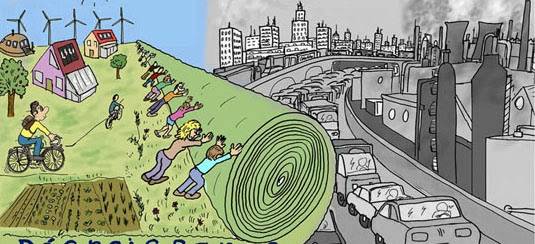"It is essential to overcome the capitalism of growth"
- At the end of October, the Subai Erakuntza Foundation held a conference on growth in Pamplona. There, Luis González Reyes (Madrid, 1974) delivered his speech. It was based on the book published in 2023 with Adrián Almazán: “Growth: from what to how. Proposals for the Spanish State”. Ph.D. in Chemical Sciences, she has worked for nine years with the confederal coordination of Ekologistak Martxan and is currently working in the Garúa cooperative, which combines training, research and eco-social entrepreneurship.

In the book it is said that the collapse is gradually becoming, and that the growth is a way to combat it. What is the serious situation that we are living in today?
When you talk about the extreme situation, you talk about climate change in particular, but it's more than that. It is the loss of biodiversity, as serious as the first, or the deterioration of ecosystem functions such as pollination, water and air purification, or soil quality... And all of that affects the economy and people's lives. In addition, we have an energy crisis. Fossil fuels are our main source of energy – more than 80% – of which we can already see clear signs of exhaustion, on which our societies are totally dependent.
Difficulties in accessing many other increasingly important products are also increasing. For example, phosphorus, the key to industrial agriculture; or copper, the key to the whole electrification process.
All these difficulties, moreover, are occurring at a time when inequalities are increasing, leading, for example, to energy poverty. The values of democratic coexistence are also in decline. I mean, by the end of the 20th century, we've known a world, and that's in decline, let's call it as you want, and we're entering situations that are unknown to us.
There is a certain fear of climate change in European society, but not too much. This is a difficulty in dealing with this situation.
Fear is a basic functional component of the person: if we were not afraid of what could harm us, we would disappear as people or species, because we would end up embracing what harms us. A summer of six months or more, and also with a scarcity of rains, and a growing drying of the territory -- that's something that can be scary. Our entire economic model is petroleum linked, this is one of the main causes of our diseases, the main culprit of global warming, and it's also exhausted... There is a terrible situation.
But fear is not enough, with fear we become small, we flee to a worse place, like the extreme right. So we need to build communities where hope is an essential component. If we organize collectively in the face of the great challenges that we have, we can find mechanisms to deal with them and, furthermore, maybe we can live better than we have so far. So fear does, but also hope, joy and other emotions.
In view of this situation, you are proposing degrowth. Can you explain what it is?
The Decline wants to respond to a crisis, mainly climatic and social. It proposes three broad lines of work from a climate point of view. The first is the reduction in the consumption of energy and materials that the environment will be able to withstand. Secondly, the impetus of local economies, where global economies demand a high level of energy consumption, which would ultimately make room for the current global social order. And the third is the integration of natural flows into our lives. Let me explain by way of an example: we talk a lot about circular economy, but societies are far from it, only the 8% we produce is circular. However, there's a circular economy on the planet, ecosystems work this way, they're able to recycle almost everything. Therefore, we should not turn our backs on the functioning of life, but follow its rules.
This means that society’s metabolism must be more linked to agriculture than to industry or services. And within that agricultural metabolism, we have to look above all at agroecology, because it considers the ecosystem as an ally and not as an enemy to be defeated.
You mentioned the environmental challenges. And what are the social ones?
Mainly the redistribution of wealth. This is done through concrete policies: fiscal policy, expropriation, basic incomes, or others. Of course, in order for all the measures so far mentioned to enter into force, it is essential to overcome capitalism. To do so, we must build economic autonomy that meets our needs, so as not to depend on the market.
The book mentions ten areas of the economy to address the decline. Three of them are as follows: How do we make the decline in the energy sector?
The book is addressed to the Spanish State, but in this case it is also valid for the Basque Country. There is no fossil fuel in our territory, so we have great dependence on them. Renewables have not served to replace fossils, but have simply increased energy consumption, except in the electricity sector.
In view of this situation, the use of renewable energy is essential. However, this does not mean that where there is fossil energy it becomes renewable and it is, everything will remain the same. Renewable energies, simplified a little, are almost antagonistic to fossils: fossils can accumulate in stock and use them whenever you want; not renewables, depend on many characteristics, such as the sun, the wind... The strength of the fossils is very concentrated, if I burn a liter of oil, I get enormous energy, while renewable energy comes in a very dispersed way. The energy of the sun reaches a lot of the planet, but it's very dispersed, so we have to put a lot of solar panels in order to get a significant amount of energy. And that's a problem, because there's a conflict in the territory between energy, food and biodiversity.
The jump from one to the other will occur gradually, but surely we will not have electricity on demand, as now, for 24 hours and 365 days. We'll have less energy available. That does not mean that we cannot live in dignity, but that we will have to live in a different way.
So far, renewables are large and their construction requires a lot of materials. We are therefore saying renewable, but that is not entirely true. In addition, the electrification of some sectors of our economy will be very difficult, such as petrochemical or transport. Nothing can replace the current mobility of fossils to transport, electricity, hydrogen and agrofuels.
Therefore, we propose to opt for renewables, but they should be built with renewable materials, integrated into ecosystems without distorting them. In addition to generating electricity, we must harness renewables to heat and direct work, other important elements in this transition.
The book says we should move from the 78 gigajoules a person spends a year to 36.8. This is reducing by more than half. What are we going to take out of our lives?
In 2020, when we were in our homes because of the pandemic, we realized two very important things: most of the economy serves no purpose at all to satisfy what the person needs to live. On the other hand, although the economy had slowed down a lot, we generally had no problems in providing the necessary items. It was there that we can drastically reduce the level of consumption and that does not affect people's dignity. What’s more, if we didn’t dedicate ourselves to jobs that bring nothing to the majority of society, we might gain in quality of life.
We will focus on the agricultural sector.
The Spanish primary sector is not the automotive or metallurgy sector, but the food sector. The starting point is therefore not bad. In general, the food sector must be the first, so we must grow and be the tractor of others. But not in any way, but in the agroecological. The model is not that of Almería, where the land is completely destroyed and huge quantities of plastics and garbage are produced. Nor is the macroin, which generates organic waste, but which in such large quantities become totally polluting for the environment. Therefore, this agriculture must be respectful of ecosystems, plural, linked to people’s needs and, above all, designed for local consumption and not for export.
A big question: Would it be possible for Euskal Herria here to produce all the necessary food?
A detailed analysis should be made, but I would say yes. Good land preparation, agroecological production can be similar to the industrial model, but also with a great advantage, which is sustainable in time. Studies have been carried out in Vitoria-Gasteiz with large areas of the area to see if it would be possible to feed the capital, and if I am not mistaken, it has gone more or less than yes.
We will look at the industry in the Basque Country.
In general terms, the Basque economy is a great digester of raw materials: here comes a lot of raw materials, a product is generated and then exported. This is a huge energy dependency, and it also makes you a big CO2 generator. So we have to release the big knots inside that model and turn to a very different model.
The industry has three axes of transformation. One is the reduction: here we have to make the automotive and metallurgy smaller, for example. The second axis is the industry in which we need to grow, for example that of food, where furniture and clothing are also imported, so we need to grow and diversify the industry to produce what is needed in it. And the third axis is the industrial model itself: you have to change the types of energy, the materials, the waste processes... A major technical transformation would be necessary.
In metallurgy, for example, in furnaces it is better to use electricity than fossil fuels, which is already done in general, but it should be considered as raw material, above all, for the use of scrap. Nowadays iron is mainly used for construction, but it is not necessary for it. In the state or here we have enough buildings to live for those of us who live, and if we do something we have to rehabilitate it.
What about automotive? The electric car cannot replace the conventional car.
The production of the electric car requires large quantities of minerals, many of them with signs of exhaustion, and most of them have a great influence on the areas that have been extracted and their people. The second option is to boost public automotive, but of course, that cannot replace jobs in the field of today’s car. So when the solution is so complex and the future of these sectors is going to coincide, sooner or later, with the limits of the planet, what will we do? Will we save people or sectors? Our societies have the resources to bet on people rather than the sectors that are lost.
How can the reduction of jobs be reconciled with the defence of jobs?
The situation is complicated and difficult, and the work that trade unionism is doing in Euskal Herria is exemplary in this sense; each in its own way, but ELA, LAB and ESK are thinking about it. That in other places is unthinkable. What are we going to wait until capital closes those factories? We know how they do it: close it and ready. We are therefore building union mattresses to deal with this whole situation. The Basque Country is one of the world’s largest emitters of CO2 per person, so it must assume its consequences and, if it does, things must be done differently.
“No to super-technological renewables,” is another of your cries. Are renewables not a step in the decline?
We are not seeing an energy transition. It is another business area, in which you are simply putting money and already, as in housing or investment funds. Infrastructures are located wherever possible, as far as possible, there is no planning and the protagonist is not the citizen but the transnational company. The planet is flying at the expense of many countries and many people in the South.
It is clear that renewables have far less impact on the environment than fossil and nuclear energies, but the current model is not a transition model. We do not say that you cannot put a windmill any more, but to encourage the transition, and not in the current model. Why? Because time is fundamental in this critical situation: Maybe in the 1970s we could think about how to make the transition quieter, but today we haven't, by 2024 we've already surpassed that 1.5 degree security temperature, the loss of biodiversity is huge, the drop in oil is evident -- we don't have mattresses of time, so the measures to take are emergency measures, radical measures, able to cope with the situation.
It refers to simple technology and, in the light of the examples, it seems that it is intended to be traced back to times prior to the industrial revolution.
On the one hand yes and on the other no. This year we have produced a report called “Simple Techniques”, with a reflection on how we can have the techniques that adapt to the challenges we face. On the one hand, we know that these simple techniques have allowed people to live with dignity for a long time and we are very well controlling their influence. On the other hand, there are the techniques we use today, they are quite new and we are seeing their influence. But what we're seeing is that some of the new technologies can have a huge impact on the environment, for example, geoengineering. However, not all technological innovation is bad, and we can certainly continue to use many of them. We can improve many of the old techniques with the engineering knowledge we have.
Another key idea of degrowth is, according to you, the decentralization of power. Can you explain?
Today, the difference between those who have the most and those who have the least is the largest in history. And talking about wealth sharing and power sharing is almost the same, because both are absolutely linked. So you have to distribute power, you have to empower yourself and you have to be able to make decisions about our lives. But we will not succeed if we do not build economic autonomy. Today, we buy almost everything we need to live in the market, we need money for it and a job to have money ... From there everything is a wheel, when we find employment, we will defend it with teeth and teeth.
That is very logical and humane, but at the same time, we feed the monster that is destroying our environment and our society. We must therefore break that circle and, little by little, build economic autonomy. So we have to satisfy a part of our food and our energy, our care -- the basics that we need to live. Because once we've satisfied this fundamental thing, we can decide much better what we're going to spend the rest of our time on.
When you talk about strategies to feed growth, we talk about information, emotions and experience. All three are necessary, as you say, but you prioritize experiences.
Human beings need information to be coherent, but knowledge is not the only one that leads us to initiative. We know that the climate is in crisis, but we do not act accordingly. The second component is the construction of new narratives and imaginaries: they have more activating force, but sometimes we also see them as stories, and that's not entirely activating. What really activates us is to see those stories done. If I can visit an ecopic society, however imperfect it may be, it is a concrete reality, which greatly stimulates imaginary processes. Human beings are not in favour of competition, but since competition is permanently rewarded in this society, we integrate it into our daily lives. If cooperation were to be promoted equally and continuously, the majority of the population would be cooperative.
For you, commonalism is the main basis for the construction of growth, not the state. Can they be accessories?
The State has 6,000 years of history and has been a country of all kinds, but none of them has been fair, sustainable and democratic. Therefore, the conclusion is that the state format is not emancipatory and that it fossilizes hierarchies. Two, the present state is living from capitalism and needs the system to function well in order to live, so it can hardly be thought that it may have an interest in reversing the situation. Three, the state format is more resilient than others, so it may not have to disappear entirely, but then it has to have less influence.
The networks that society is weaving are the ones that we have to drive and recover. Today, for example, the networks of social economy and solidarity; different models of families that support each other; the communities of coexistence that are being built... These may be the first signs of building another economy. In any case, commonality is nothing idealizable, and these are also spaces to be built. In the Middle Ages, for example, there are interesting things to pick up for the present. In Navarre is Arterra, which works the sociocracy, an innovative and powerful way to manage what is shared, unprecedented historical. Let's take the past and the present and make a different future.
With all that he has exposed, this model of growth requires the overcoming of capitalism. No one has yet succeeded.
Two ideas in this regard. One, capitalism is a relatively young socio-economic system, only four or five centuries old; the state is 6,000 years old and the patriarchy more. But as a system of permanence in time, capitalism still has to prove a lot, among other things because to perpetuate itself in time it has to grow continuously, and that's not going to be possible. Of course, that doesn't mean that it's the end of capitalism, capitalism is not just going to jump, it's going to flush.
The second idea is that we live a critical time that will force us to give leaps higher than we would do in “more normal” times. Degrowth is difficult, we have no recipe to make it, no path to do it, we have to do a lot of work and we are getting started.
(Note: This interview is an extensive version of what appears this week in the magazine).
On 3 September the Official Bulletin of Navarre published the announcement by the Government of Navarre announcing the update of the Navarre Energy Plan. This should be an important step for the future of our community, taking into account the importance of energy and its use... [+]
We have had several crises in recent years. Firstly, the economic crisis that had devastating and global effects in 2008, of which we have not yet recovered 15 years later. Then came a crisis as a result of a serious global pandemic and, finally, we are in a new crisis of prices... [+]
In the short term, humanity has at least two major existential problems -- atomic war, half forgotten, but -- and climate change. The first would be fast and the other would be slower in the face of our lives, but very fast in view of the history of humanity.
It is undeniable... [+]
Antonio Turiel (Leon, Espainia, 1970) ingeniaria itzal handiko aditua da energia-krisia, iraunkortasuna eta desazkundeari lotutako gaietan (ARGIAk 2015ean elkarrizketatu zuen). Berrikitan bere The Oil Crash blogean argitaratu du urtarrilaren 15ean a Vall d'en Bas (Katalunia)... [+]
In these times of impoverishment, it is a mockery that the Provincial Council of Bizkaia wishes to spend more than EUR 400 million on the construction of the subfluvial tunnel. Moreover, looking at the economic and technical dimensions of the infrastructure, who can assure us... [+]
The Economic Development Advisor of the Government of Navarra, Manuel Ayerdi Olaizola, has just published in several Navarros newspapers the opinion article "Reducing the temperature of the planet is a priority". In it, it tells us about the unsustainability of our community's... [+]
It seems that behind the coronavirus pandemic there is a loss of biodiversity in many areas of the world. Whole ecosystems disappear to accommodate the crops and companies that the capitalist system needs. In the absence of plant and animal diversity, diseases affecting wildlife... [+]






















